May 22, 2025 | 09:49 GMT +7
May 22, 2025 | 09:49 GMT +7
Hotline: 0913.378.918
May 22, 2025 | 09:49 GMT +7
Hotline: 0913.378.918
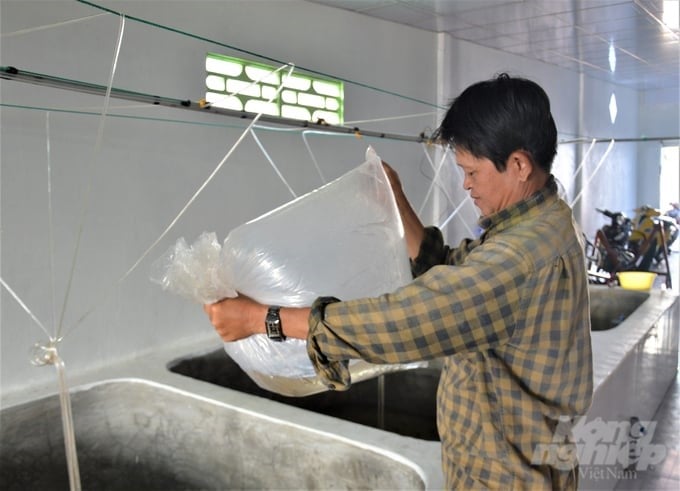
Kien Giang shrimp farmers are very concerned about the lack of quality shrimp seeds when the source of shrimp seeds imported into the province that is randomly tested by the functional sector has a fairly high disease-infection rate, greatly affecting shrimp farming. Photo: Trung Chanh.
Kien Giang is the province with the second-largest brackish water shrimp farming area in the country and a farming area of about 136,000 hectares in 2023. With this farming area, every year, Kien Giang farmers need about 10 billion shrimp seeds for farming. However, according to the Kien Giang Sub-Department of Fisheries, in 2023, the province’s shrimp seed production only reached more than 4 billion heads. Of these, about 1.5 billion heads have been sold to neighboring provinces. The remainder was supplied within the province to serve industrial and semi-industrial shrimp farming, meeting more than 26% of demand.
Mr. Hua Hoang Vu, an industrially intensive shrimp farming household in Binh Tri commune, Kien Luong district, Kien Giang province, is very concerned about the lack of quality shrimp seeds to serve farmers when the source of shrimp seeds imported into the province that is randomly tested by the functional sector has a fairly high disease-infection rate. Meanwhile, for shrimp farming, the quality of shrimp seeds determines 30–40% of the success rate of each farming crop.
The local supply of shrimp seeds is still passive and does not meet requirements, so every year Kien Giang province has to import large quantities of shrimp seeds from the Central provinces and some neighboring provinces.
Ms. Nguyen Thi Kim Oanh, Deputy Head of the Observation, Testing, and Community Veterinary Station (Kien Giang Sub-Department of Animal Husbandry and Veterinary Medicine), said that at the beginning of the brackish water shrimp farming crop of 2023, the Sub-Department coordinated with relevant units to organize a mobile inspection delegation on aquatic seeds.
At the same time, it is recommended that districts proactively organize local interdisciplinary delegations to inspect the operation of seed production and business establishments in the area. This aims to manage the situation of seeds imported into the province year-round and strictly handle violations of transporting seeds of unknown origin and undersized seeds. Thereby, 11 cases of administrative violations of transporting and trading unqualified shrimp seeds were handled, forcing the destruction of 775,000 post-larvae shrimp.
Regularly coordinate with the Sub-Departments of Animal Husbandry and Veterinary Medicine of provinces exporting seeds to Kien Giang on properly implementing aquatic seed quarantine processes and procedures according to regulations. In 2023, the total number of shrimp seeds imported into the province was over 6.8 billion whiteleg shrimp post-larvae from Ca Mau, Bac Lieu, Khanh Hoa, Ninh Thuan, Binh Thuan, Ba Ria-Vung Tau, and nearly 657 million giant tiger prawn post-larvae from Ca Mau, Tien Giang, Ninh Thuan, and Binh Thuan provinces. Of which, nearly 2.4 billion whiteleg shrimp post-larvae and 2.5 million giant tiger prawn post-larvae were quarantined for export.
Actively monitor a number of dangerous infectious diseases in shrimp seeds to assess the disease prevalence rate. In 2023, 11 monitoring batches were carried out, collecting 98 shrimp seed samples from shrimp seed production, trading, and nursery establishments in the province to test for shrimp diseases such as white spot disease (WSD), acute hepatopancreatic necrosis disease (AHPND), infection with infectious hypodermal and hematopoietic necrosis virus (IHHNV), and enterocytozoon hepatopenaei (EHP). As a result, 1/98 samples were positive for WSD, 1/98 samples were positive for AHPND, 15/71 samples were positive for IHHNV, and 11/71 samples were positive for EHP.
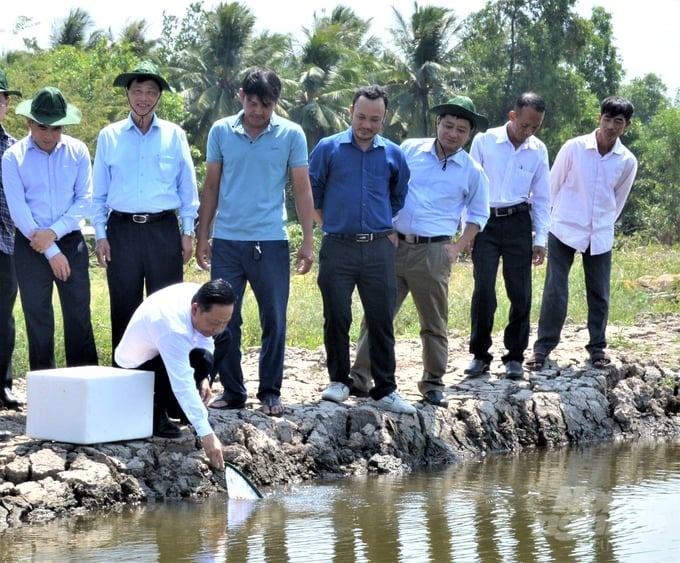
Currently, Kien Giang province still heavily depends on the source of shrimp seeds imported into the province, while the quality of shrimp seeds determines 30–40% of the success rate of each farming crop. Photo: Trung Chanh.
It is concerned about the risk of "translucent post-larvae disease" (TPD), a new disease appearing in whiteleg shrimp post-larvae (PL). This disease was first detected in whiteleg shrimp hatcheries in China around March 2020. The disease often infects shrimp seeds and causes a high death rate, especially from PL4 to PL7, with 90–100% dying after only one day of detecting abnormal signs.
According to Ms. Nguyen Thi Kim Oanh, information from some shrimp hatchery farms in Ninh Thuan indicates that it is possible that TPD has appeared and caused damage to shrimp seeds here. Through monitoring, it is recorded that a whiteleg shrimp farming pond in Kien Luong (with shrimp becoming sick after more than 1 week of farming) had clinical manifestations quite similar to TPD described by the Department of Fisheries and Department of Animal Health.
The test results of the Regional Sub-Department of Animal Health VII showed positive results for AHPND caused by Vibrio parahaemolyticus. It cannot be confirmed whether the TPD pathogen is present or not because domestic laboratories have not been able to do so.
In 2023, in addition to market price factors such as increasing input prices and decreasing shrimp prices, the complicated developments of the weather situation and diseases in farmed shrimp made shrimp farmers encounter many difficulties.
To support shrimp farmers, since the beginning of the year, the Kien Giang Sub-Department of Animal Husbandry and Veterinary Medicine has carried out 23 batches of environmental observation at 16 headwater points serving the province's key brackish water shrimp farming areas in order to promptly notify and recommend appropriate handling measures.
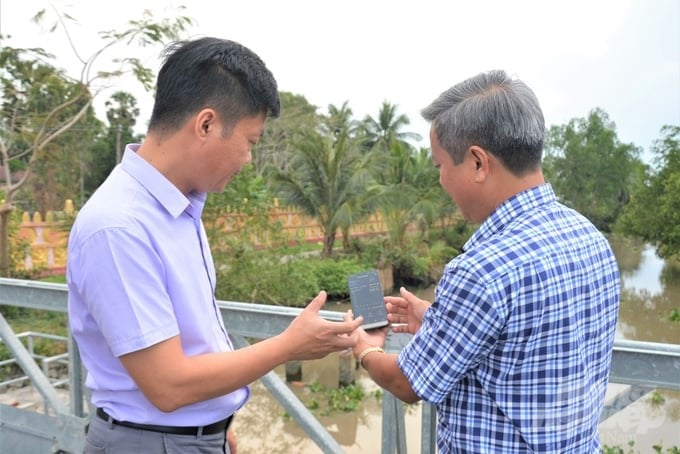
The Kien Giang Sub-Department of Animal Husbandry and Veterinary Medicine periodically carries out water environmental observation, and people can easily access the results from their smartphones to adjust shrimp farming and seed stocking plans appropriately. Photo: Trung Chanh.
Manage and operate a system of seven automatic water monitoring stations located at points supplying water for key aquaculture areas in Ha Tien city, Kien Luong, An Bien, An Minh, and Vinh Thuan districts.
Observation results from the system are posted on the website of the agriculture sector and on the app, so people can access them directly from mobile devices such as laptops and smartphones to adjust their shrimp farming and seed stocking plans appropriately.
Proactively monitor and early detect dangerous infectious diseases caused by viruses in brackish water shrimp, aiming to warn and take timely handling measures to prevent the disease from spreading on a large scale.
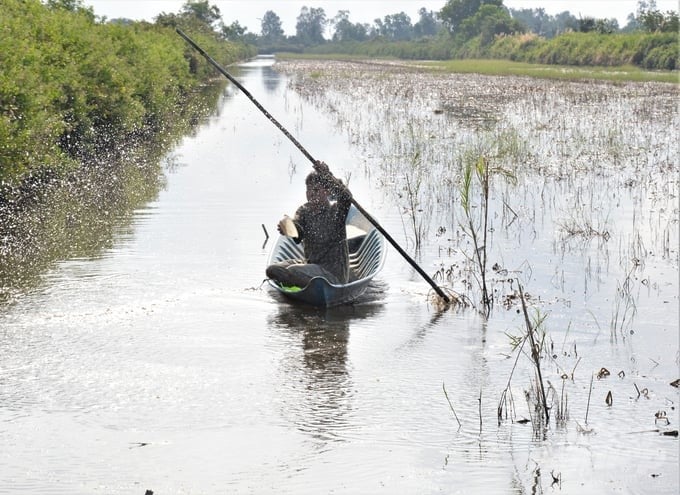
Veterinary forces regularly monitor and early detect dangerous infectious diseases caused by viruses in brackish water shrimp and provide chemical support to shrimp farming households to localize, stamp out epidemics, and avoid spreading on a large scale. Photo: Trung Chanh.
Strengthen surveillance and disease prevention in farmed shrimp. Since the beginning of the year, the entire Kien Giang province has recorded a total loss of brackish water shrimp farming area of 1,096 hectares. Of which, the damage caused by diseases is 357 hectares; the remaining damage is due to adverse fluctuations in environmental factors.
For shrimp farming areas damaged by diseases, the Kien Giang Sub-Department of Animal Husbandry and Veterinary Medicine has sent staff to directly guide shrimp farming households to localize, stamp out epidemics, and instruct them not to discharge water or waste from the outbreak into the environment. Provide more than 26.5 tons of the free chlorine antiseptic chemical to destroy the outbreak.
Ms. Hong Mong Huyen, Faculty of Agriculture, Kien Giang University, said: "Translucent post-larvae disease" appears on whiteleg shrimp at the seed stage from PL4–PL7. The incidence is up to 60% on the second day after the first observation of abnormal individuals and even up to 90–100% in severe cases on the third day. Clinical manifestations include pale or colorless hepatopancreas, an empty digestive tract, and the body becoming transparent. The method of TPD prevention and treatment is to control the Vibrio population in the hatchery. Prevent sources of bacterial infection from water, algae, artemia, tools, etc. Use disinfectants and health-enhancing substances for shrimp seeds.
Translated by Huyen Vu Thu
![Reducing emissions from rice fields: [3] New values generated from carbon credit](https://t.ex-cdn.com/nongnghiepmoitruong.vn/608w/files/content/2025/05/19/dsc09613-144700_71-150957.jpg)
(VAN) In addition to helping safeguard the environment, the low-emission rice cultivation model also generates new opportunities for farmers by leveraging the carbon credit market.
![Ho Chi Minh city adapts to climate change: [1] Vulnerable in the whirlwind of development](https://t.ex-cdn.com/nongnghiepmoitruong.vn/608w/files/duyenht92/2025/05/19/3131-ngap-nongnghiep-163121.jpg)
(VAN) As the country's economic engine with a rapid urbanization rate, Ho Chi Minh city is facing increasingly serious consequences of climate change.

(VAN) On May 21, Minister of Agriculture and Environment Do Duc Duy worked with Mr. Olivier Brochet, Ambassador Extraordinary and Plenipotentiary of the French Republic to Vietnam.
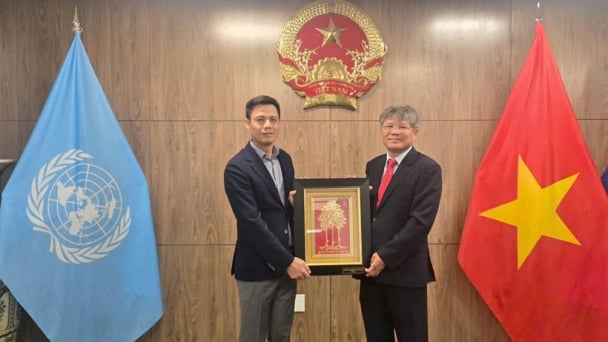
(VAN) VRG recently conducted a visit and working trip to the United States to demonstrate its efforts in redefining the role of rubber enterprises in the global value chain.

(VAN) In 2024, over 295 million people across 53 countries and territories faced acute hunger—an increase of almost 14 million people compared to 2023, while the number of people facing catastrophic levels of hunger reached a record high.

(VAN) World Environment Day 2025 (June 5) carries the theme 'Beat Plastic Pollution' continuing to emphasize the global urgency of addressing the plastic waste crisis.

(VAN) This was the assessment shared by experts at the workshop titled 'Assessing the Role and Potential of Low-Emission Rice Production Systems in Vietnam,' held on the morning of May 19.